If you’re experiencing frequent plumbing issues like low water pressure, discolored water, or recurring leaks, it might be time to consider a whole house repipe. Although the thought of repiping your entire home may seem daunting, it’s often the most efficient and long-lasting solution to aging or damaged plumbing systems. In this blog, we’ll explore the differences between PEX repipe, copper repipe, and how a repipe specialist or repiping company can help you make the right decision.
What is a Whole House Repipe?
A whole house repipe involves replacing all the existing water supply pipes in your home with new ones. Over time, pipes made from older materials such as galvanized steel or polybutylene can deteriorate, leading to major plumbing issues. Repiping provides a fresh start for your plumbing system, improving water quality, pressure, and overall performance.
It’s not just about fixing leaks—it’s a long-term investment in the safety, value, and functionality of your home.
Signs You Might Need a Repipe
Before calling in repiping contractors, it’s helpful to recognize the warning signs. Here are some common indicators:
- Discolored or rusty water
- Low water pressure throughout the house
- Frequent pipe leaks or bursts
- Unusual smells or tastes in tap water
- Noisy plumbing (e.g., banging pipes)
- Visible corrosion on exposed pipes
If your home is over 30 years old and still has its original plumbing, it’s a smart move to have a professional evaluate the system, even if you haven’t had major issues yet.
Choosing Between PEX and Copper Pipes
When repiping your house, the two most popular materials are PEX (cross-linked polyethylene) and copper. Each has its pros and cons, and the right choice depends on your budget, location, and personal preference.
PEX Repipe
A PEX repipe is popular because it’s flexible, affordable, and easy to install. PEX piping can bend around corners without the need for joints, which reduces the chances of leaks. It’s also resistant to scale, chlorine, and corrosion, making it ideal for homes in various climates.
PEX is less labor-intensive than copper, which typically translates into lower installation costs. It’s also quieter, absorbing the sound of running water better than metal pipes.
Copper Repipe
A copper repipe is known for its durability and long-lasting quality. Copper pipes are resistant to UV rays, which means they can be installed outside or in areas exposed to sunlight. They also have a proven track record, with a lifespan of up to 50 years or more.
However, copper is more expensive than PEX and requires soldering during installation, which can increase labor costs. In some regions with acidic water, copper may corrode faster, so it’s essential to have a professional assess the water quality before choosing this option.
Why You Need a Repipe Specialist
Hiring a repipe specialist ensures the job gets done correctly and efficiently. These professionals have specific experience with repiping projects, meaning they know how to minimize disruption to your home while completing the work in a timely manner.
Unlike general plumbers, repipe specialists have the tools, team, and processes in place to handle full home repiping projects. They can often complete the job in just a few days and ensure your walls and finishes are returned to their original condition afterward.
How to Choose the Right Repipe Company
Not all plumbing companies are created equal. When looking for a repipe company, consider the following:
- Experience and specialization: Look for a team that specializes in repiping, not just general plumbing work.
- Licensing and insurance: Ensure they are fully licensed and insured in your area.
- Customer reviews and references: Ask for referrals or read reviews to gauge customer satisfaction.
- Warranties and guarantees: A trustworthy company will stand behind their work with a solid warranty.
What to Expect During the Process
A repiping project typically begins with a home inspection, followed by a detailed estimate. Once you hire your repiping contractors, they’ll plan the layout, shut off your water supply, and begin replacing old pipes with new ones.
During the project, you may experience some inconvenience—such as short periods without water—but professional contractors work hard to minimize downtime and keep your home as functional as possible.
After the repipe is completed, most companies will test your new plumbing system thoroughly to ensure everything is working perfectly.
Final Thoughts
A whole house repipe may seem like a big undertaking, but the peace of mind it brings is invaluable. Upgrading to modern plumbing materials like PEX or copper not only improves water flow and quality but also protects your home from future water damage.
Whether you opt for a PEX repipe, copper repipe, or rely on a trusted repipe specialist, taking this step is one of the smartest decisions you can make for the longevity and safety of your home.
If you’ve been dealing with frequent leaks or outdated plumbing, now is the perfect time to call in a professional and get your plumbing system back on track.

